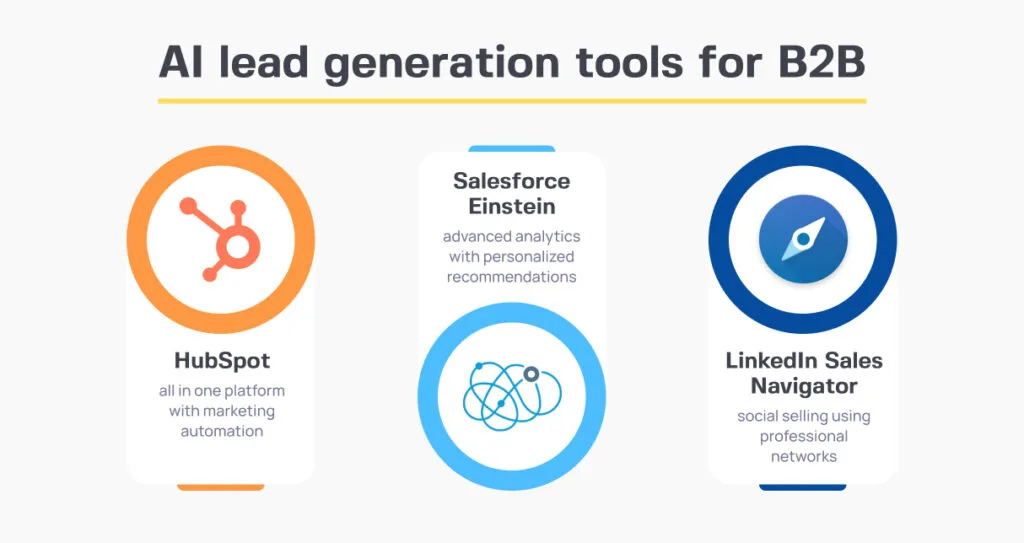How Growth Systems For B2B streamlines supply chain management
Wiki Article
Transform Your Company: How AI Automation Is Transforming B2B Workflow
AI automation is improving B2B procedures in significant ways. Business are adopting this innovation to streamline process and enhance efficiency. As tasks end up being automated, businesses can concentrate on critical development instead of ordinary procedures. The ramifications of these changes are profound, influencing every little thing from consumer communications to provide chain monitoring. Comprehending this improvement is crucial, as the future of service depend upon the efficient combination of AI right into daily procedures. What lies in advance in this advancing landscape?Recognizing AI Automation in B2B Context
As services significantly seek efficiency, comprehending AI automation within the B2B context comes to be essential. AI automation describes the application of expert system technologies to streamline and enhance organization processes. In B2B settings, this can show up in different types, such as automating information entry, maximizing supply chain logistics, or boosting supply management. Organizations leveraging AI automation can reduce functional prices, reduce human mistake, and rise performance. Furthermore, AI tools can evaluate huge amounts of information to provide workable insights, making it possible for educated decision-making. B2B Growth Consulting. The assimilation of AI right into B2B operations not just transforms typical process yet likewise fosters dexterity and scalability, allowing companies to adjust to market adjustments promptly and efficiently. Embracing this modern technology is essential for remaining affordable in today's digital landscapeEnhancing Client Experience With AI
Just how can AI transform customer communications in the B2B sector? AI enhances customer experience by offering individualized, timely, and effective service. Online assistants and intelligent chatbots can manage inquiries 24/7, guaranteeing clients receive immediate responses. Growth Systems For B2B. Anticipating analytics enable businesses to anticipate customer demands, tailoring offerings appropriately. AI-driven systems can assess client data, enabling targeted advertising techniques and enhanced interaction. Furthermore, belief analysis devices analyze consumer comments, helping companies tweak their solutions. By automating routine jobs, AI releases up human sources to focus on high-value interactions, fostering stronger connections. The assimilation of AI not only improves interaction but also constructs trust fund and commitment, ultimately boosting the general consumer experience in the competitive B2B landscape
Streamlining Supply Chain Management With AI
AI plays an essential duty in maximizing supply chain administration through predictive analytics and automated stock control. By leveraging predictive analytics, organizations can anticipate need fluctuations and readjust their operations appropriately. Automated inventory systems better boost efficiency by ensuring stock degrees are maintained, lowering waste and improving overall efficiency.Anticipating Analytics Advantages
While several companies encounter difficulties in taking care of complicated supply chains, predictive analytics provides a transformative option by leveraging huge quantities of information to anticipate fads and optimize operations. By analyzing historic information alongside real-time inputs, predictive analytics enables business to recognize patterns and anticipate future demands. This foresight permits for more informed decision-making, improving performance and minimizing expenses. In addition, organizations can proactively address potential disturbances by anticipating supply chain bottlenecks and adjusting methods appropriately. The combination of anticipating analytics not only enhances stock administration yet additionally promotes stronger partnerships with distributors and clients with timely responses to market shifts. Inevitably, the fostering of predictive analytics empowers organizations to remain competitive in a progressively dynamic service setting.Automated Supply Control
As companies increasingly depend on anticipating analytics to maximize supply chain procedures, automated stock control emerges as an effective ally in this initiative. By leveraging AI-driven technologies, companies can enhance precision in inventory monitoring, minimize stockouts, and decrease excess stock. Automated systems examine real-time information, allowing businesses to forecast need changes and change stock levels appropriately. This not only simplifies order fulfillment yet additionally boosts capital administration by minimizing holding costs. Additionally, AI can recognize patterns in buying actions, enabling more educated decision-making regarding provider partnerships and procurement approaches. Eventually, automated stock control not just boosts functional performance but additionally boosts customer complete satisfaction by ensuring product accessibility, strengthening its duty as a vital element in modern supply chain monitoring.Data-Driven Decision Making Powered by AI
In today's affordable landscape, organizations significantly depend on data-driven decision-making to boost functional effectiveness and critical preparation. Artificial knowledge plays a critical function in this makeover by assessing substantial quantities of information swiftly and accurately. AI algorithms recognize patterns, fads, and anomalies that human experts may neglect, allowing businesses to make informed decisions based on real-time insights. This capacity enables companies to forecast market changes, maximize source allocation, and tailor their offerings to consumer requirements. Additionally, AI-driven analytics assist in threat assessment and management, ensuring that companies can browse uncertainties properly. By leveraging these innovative devices, businesses not only enhance their decision-making procedures however likewise acquire an affordable advantage in their respective markets, promoting development and advancement.Automating Repetitive Jobs to Boost Productivity

Incorporating AI With Existing Business Processes
Several organizations face challenges when integrating AI with existing company processes. These difficulties frequently stem from an absence of understanding concerning exactly how AI can complement existing process. Effective integration calls for a complete evaluation of existing procedures to determine locations where AI can add worth. Organizations has to additionally guarantee that their groups are geared up with the necessary abilities to leverage AI tools properly. On top of that, seamless integration depends upon the compatibility of AI innovations with tradition systems. Business usually find it helpful to embrace a phased strategy, piloting AI applications in particular departments before a wider rollout. This method enables adjustments based upon first feedback, assuring smoother changes and maximizing the possible advantages of AI automation in enhancing productivity and performance.Future Patterns in AI Automation for B2B Business
As B2B firms aim to the future, enhanced information analytics is set to play an essential duty in driving decision-making processes. Intelligent process automation will likewise become a crucial fad, boosting and enhancing procedures efficiency. These innovations promise to improve just how companies run, ultimately leading to more active and receptive organizations.Improved Data Analytics
While organizations increasingly count on data-driven choices, the duty of AI in enhancing information analytics is becoming more essential in B2B operations. AI innovations help with the collection and analysis of huge datasets, making it possible for firms to discover valuable understandings that drive critical preparation. Predictive analytics powered by AI permits companies to anticipate market trends and consumer behavior with higher precision. Additionally, artificial intelligence formulas boost information analysis, recognizing patterns that human analysts may overlook. This causes even more enlightened decision-making and maximized source appropriation - B2B Automation Consulting. As B2B business remain to embrace AI-driven analytics, they can anticipate better functional effectiveness, improved customer experiences, and a competitive edge on the market. The future of data analytics in B2B rests on integrating innovative AI abilitiesSmart Process Automation
Intelligent Refine Automation (IPA) is positioned to revolutionize B2B operations by effortlessly incorporating AI modern technologies with conventional service procedures. This ingenious strategy combines robot procedure automation (RPA) with sophisticated AI abilities, making it possible for organizations to improve effectiveness and accuracy. Companies can automate recurring tasks, such as information entry and invoice handling, allowing workers to concentrate on calculated efforts. IPA additionally leverages artificial intelligence and natural language handling, enhancing decision-making with real-time data evaluation. As organizations increasingly embrace IPA, they can anticipate substantial cost decreases and enhanced consumer experiences. Future fads indicate an expanding reliance on IPA for scalability and adaptability, positioning organizations to prosper in an ever-evolving marketplace. Accepting IPA will be necessary for keeping competitiveness in the digital age.Frequently Asked Inquiries
What Industries Benefit A Lot Of From AI Automation in B2B Workflow?
Production, logistics, finance, and healthcare markets benefit most from AI automation in B2B procedures. These markets leverage automation to enhance effectiveness, reduce expenses, enhance processes, and boost decision-making through data-driven insights and anticipating analytics.Just How Can Small Companies Carry Out AI Automation Successfully?
Tiny services can apply AI automation properly by determining repetitive tasks, picking ideal tools, integrating options slowly, educating team, and continuously examining efficiency to optimize procedures, guaranteeing a smooth changeover and making the most of effectiveness. AI Automation For B2B.What Are the Expenses Connected With AI Automation Application?
The prices associated with AI automation execution normally consist of software procurement, facilities upgrades, educating personnel, ongoing upkeep, and potential examination charges. These expenditures can differ substantially based upon the range and intricacy of the automation remedies picked.Just how Do I Gauge ROI From AI Automation Initiatives?
To gauge ROI from AI automation efforts, one ought to analyze price financial savings, productivity renovations, and profits development against application prices. Tracking vital efficiency indications over time offers beneficial insights right into effectiveness and overall roi.
What Skills Are Required to Take Care Of AI Automation Projects?
Effective administration of AI automation tasks calls for skills in task monitoring, information evaluation, programming, and recognizing AI innovations. In addition, strong interaction, problem-solving capabilities, and adaptability are important for maneuvering the complexities of such campaigns.As services significantly look for performance, understanding AI automation within the B2B context ends up being essential. The integration of AI into B2B procedures not only changes standard operations but additionally fosters dexterity and scalability, enabling companies to adjust to market changes swiftly and effectively. While services significantly count on data-driven decisions, the role of AI in improving data analytics is ending up being much more vital in B2B procedures. Intelligent Process Automation (IPA) is positioned to change B2B operations by flawlessly integrating AI technologies with standard organization procedures. Effective management of AI automation projects requires skills in job monitoring, information evaluation, shows, and visit this page comprehending AI innovations.
Report this wiki page